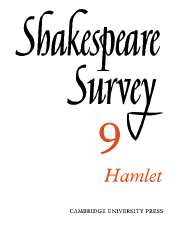Book contents
- Frontmatter
- Studies in Hamlet, 1901–1955
- English Hamlets of the Twentieth Century
- The Date of Hamlet
- Hamlet and the Court of Elsinore
- Hamlet’s ‘Sullied’ or ‘Solid’ Flesh: A Bibliographical Case–History
- Hamlet at the Globe
- Hamlet Costumes from Garrick to Gielgud
- Hamlet at the Comédie Française: 1769–1896
- The New Way with Shakespeare’s Texts: An Introduction for Lay Readers. III. In Sight of Shakespeare’s Manuscripts
- Shakespeare in the Bibliotheca Bodmeriana
- An Unpublished Contemporary Setting of a Shakespeare Song
- Garrick’s Stratford Jubilee: Reactions in France and Germany
- Shakespeare and Bohemia
- International Notes
- Shakespeare Productions in the United Kingdom: 1954
- The Tragic Curve: A Review of two Productions of Macbeth
- The Year's Contributions to Shakespearian Study 1 Critical Studies
- 2 Shakespeare’s Life, Times and Stage
- 3 Textual Studies
- Book Received
- Index
- Plate Section
Garrick’s Stratford Jubilee: Reactions in France and Germany
Published online by Cambridge University Press: 28 March 2007
- Frontmatter
- Studies in Hamlet, 1901–1955
- English Hamlets of the Twentieth Century
- The Date of Hamlet
- Hamlet and the Court of Elsinore
- Hamlet’s ‘Sullied’ or ‘Solid’ Flesh: A Bibliographical Case–History
- Hamlet at the Globe
- Hamlet Costumes from Garrick to Gielgud
- Hamlet at the Comédie Française: 1769–1896
- The New Way with Shakespeare’s Texts: An Introduction for Lay Readers. III. In Sight of Shakespeare’s Manuscripts
- Shakespeare in the Bibliotheca Bodmeriana
- An Unpublished Contemporary Setting of a Shakespeare Song
- Garrick’s Stratford Jubilee: Reactions in France and Germany
- Shakespeare and Bohemia
- International Notes
- Shakespeare Productions in the United Kingdom: 1954
- The Tragic Curve: A Review of two Productions of Macbeth
- The Year's Contributions to Shakespearian Study 1 Critical Studies
- 2 Shakespeare’s Life, Times and Stage
- 3 Textual Studies
- Book Received
- Index
- Plate Section
Summary
Garrick’s Shakespeare Jubilee held at Stratford-upon-Avon in 1769 generated a series of reactions that gave testimony to its almost unique power as Shakespearian publicity. The terms in which it publicized Shakespeare were markedly romantic. The Jubilee was a clear prefiguration of characteristic romantic attitudes towards Shakespeare, and the varied reactions to it in England, France and Germany were premonitory of the varied courses romanticism would follow. By overt statement and by dramatic presentation the Jubilee announced and fostered the interest in the poet’s biography and milieu, the connexion of his writings with medieval times, the emphasis on subjective, emotional reaction which resulted in widespread democratization of critical authority, and most specifically the concept of Shakespeare as almost literally a creator of living characters. In England these concepts were met and modified by the force of satire in the press and on the stage. Of the vast amount of writing elicited by the Jubilee, by far the greater portion was satiric, and Garrick himself was quickly forced into a compromise position by the power of public opinion. The stage productions based on the Jubilee as they appeared the following season display one by one an increasing element of ridicule. Garrick’s own play The Jubilee, staged 91 nights at Drury Lane, satirized the event he referred to by that time as “that foolish hobby-horse of mine”. The production represented a compromise, for within the satiric play Garrick retained the ‘blasphemous’ procession of Shakespearian characters that marched from the street through the audience to do obeisance to their ‘creator’s’ image on the stage, with unprecedented demand for audience participation in the idolatry. The play had the record run of the century, in 1769–70, and another extended run in the year 1776.
- Type
- Chapter
- Information
- Shakespeare Survey , pp. 90 - 100Publisher: Cambridge University PressPrint publication year: 1956



